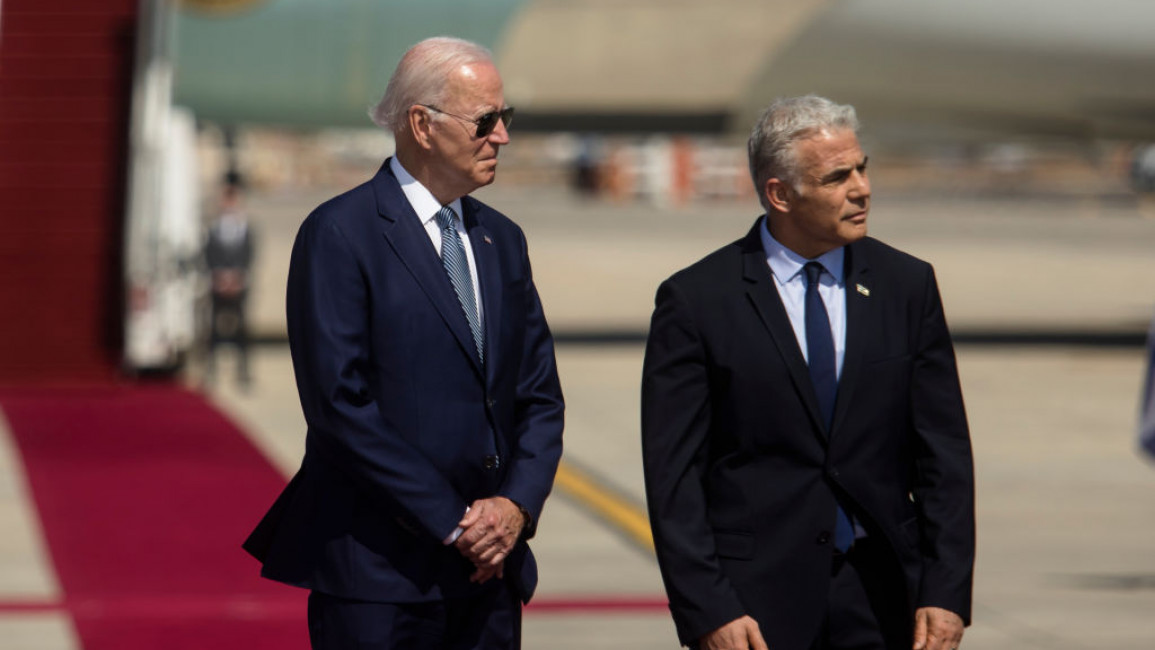Biden says he 'never' avoids raising human rights issues during Israel visit and ahead of Saudi trip
US President Joe Biden said on Thursday he would not avoid talking about human rights when he visits Saudi Arabia on the second leg of his Middle East trip and stressed his position on the murdered journalist Jamal Khashoggi was "absolutely" clear.
Biden heads to the kingdom on Friday where he will seek to boost the flow of oil and reset the relationship with a key Arab country without appearing to embrace a crown prince accused of human rights abuses.
The trip represents a delicate balancing act for a president who less than two years ago promised to make Saudi Arabia, the world's top oil exporter, a "pariah" on the international stage.
That promise was prompted by the 2018 murder of Washington Post journalist Khashoggi, a Saudi insider-turned-critic, in a plot that US intelligence says was directly approved by Crown Prince Mohammed bin Salman, who denies involvement.
However, Biden and his senior aides ultimately decided that the United States’ security and energy relationship with Riyadh was too important to isolate the Sunni Muslim powerhouse.
Biden has said his aim was to reorient — but not rupture — a strategic relationship that has weathered many storms over 80 years.
"I have never been quiet about talking about human rights," Biden told a news conference following a meeting with Israeli Prime Minister Yair Lapid in Jerusalem.
"The reason I am going to Saudi Arabia though, is much broader, it's to promote US interests," he said.
Biden made a two-day trip to Israel and the occupied Palestinian territories on Wednesday and Thursday this week.
Israel has been repeatedly accused of committing the crime of apartheid against Palestinian communities, including by Human Rights Watch and Amnesty International.
Biden's visit comes just weeks after veteran reporter Shireen Abu Akleh was shot dead when Israeli forces stormed Jenin refugee camp. Multiple news outlets and the Palestinian Authority (PA) concluded that Shireen was killed by Israel. However, her killers have not be bought to justice.
Biden's visit was met with deep scepticism from Palestinians who say their concerns on issues including self-determination and settlement building in the occupied West Bank have been swept aside by a drive to fix Israel into regional security arrangements with Arab countries.
Biden's visit to the Gulf Kingdom, during which he is expected to meet King Salman as well as Crown Prince Mohammed ahead of a summit with Arab leaders on Saturday, has faced opposition in the United States given Khashoggi's killing by Saudi agents in Istanbul.
Biden said: "I always bring up human rights but my position on Khashoggi has been so clear. If anyone doesn't understand it in Saudi Arabia or anywhere else, they haven't been around for a while."
LIVE UPDATES: US President Joe Biden lands in Israel for a Middle East tour that will see Israeli leaders urge tougher action against Iran, before travelling to Saudi Arabia on Friday ⬇ https://t.co/kc7nyeJnfv
— The New Arab (@The_NewArab) July 13, 2022
In an apparent shift in policy that could enable Biden to avoid being photographed shaking hands with Prince Mohammed, White House officials said the president would seek to reduce direct contact, such as shaking hands, during his trip.
Still Prince Mohammed, the kingdom's powerful de facto ruler, has emerged unbowed from the international outrage over Kashoggi's killing as Western leaders who once tried to isolate him now seek his support.
Biden has sought to emphasise the summit with a broader set of Arab leaders in Jeddah and downplay the role oil will play in the Saudi talks, but high crude prices accelerated by the invasion of Ukraine are one of the main reasons he decided to come.
White House officials say the talks aim to help bring Israel and Saudi Arabia closer to a diplomatic relationship, support a truce in Yemen and convince Riyadh of Washington's approach to Iran’s nuclear program.
Biden will be the first American president to fly from Israel directly to Jeddah, Saudi's second-largest city, a move the White House says represents a “small symbol” of the warming ties between Israel and Saudi Arabia. Palestinians and their allies have criticised the warming of relations between Arab states and Israel given continued human rights abuses committed by Israel.


![President Pezeshkian has denounced Israel's attacks on Lebanon [Getty]](/sites/default/files/styles/image_684x385/public/2173482924.jpeg?h=a5f2f23a&itok=q3evVtko)



 Follow the Middle East's top stories in English at The New Arab on Google News
Follow the Middle East's top stories in English at The New Arab on Google News


